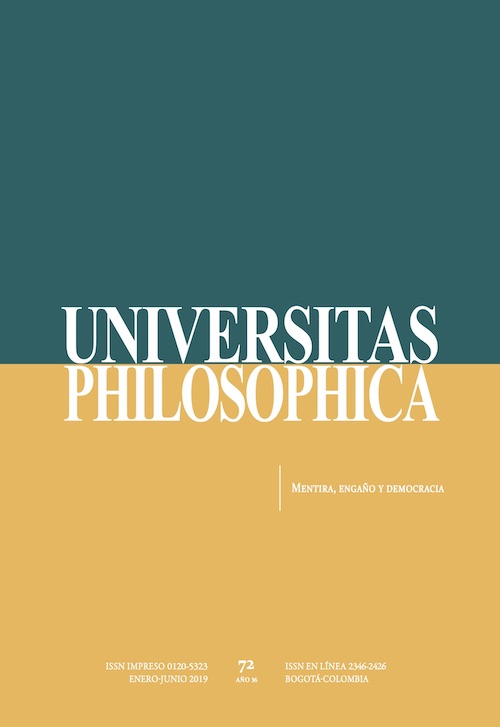Abstract
Foucault acknowledges, in his analyses of the 1970s, that Oedipus means a rupture between specific knowledge and political power. For him, there is, both in Plato and Sophocles, resistance to the social model in which the sovereign held the power of mantica, justice and political life. For both, what must disappear is the image of the wise king, who upholds, governs, pilots, and straightens out the city, releasing it from the plague and famine; and his rejuvenated version, the tyrant, who saves the city, but does so by turning away from the oracle of the gods. The Oedipal story is, therefore, the passage of political power linked to the transgressions and struggles for political power understood, since then, as purity, blindness and ignorance.
Aristóteles (2004). Poética. (Trad. A. M. Valente). Lisboa: Calouste Gulbenkian.
Chaves, E. (2014). Prefacio à edição brasileira. In: J. Allouch, A psicanálise é um exercício espiritual? Resposta a Michel Foucault (pp. 11-25). (Trad. M. R. Salzano Moraes e P. S. de Souza Jr.). Campinas: Editora da Unicamp.
Deleuze, G. (2003). Pourparlers 1972-1990. Paris: Editions de Minuit.
Deleuze, G. & Guattari, F. (1972). L’Anti-Oedipe. Capitalisme et schizophrénie. Paris: Minuit.
Detienne, M. (1967). Les Maîtres de vérité dans da Grèce archaïque. Paris: François Maspero.
Errandonea, I. (1952). El estasimo segundo del Edipo Rey de Sófocles. Ciudad Eva Perón (LaPlata): Instituto de Lenguas Clásicas.
Ésquilo. (2018). Sete contra Tebas. (Trad. T. Vieira). São Paulo: Editora 34.
Foucault, M. (1999). Microfísica do poder. (Trad. R. Machado). Rio de Janeiro: Edições Graal.
Foucault, M. (2002). A verdade e as formas jurídicas. (Trad. R. Machado; E. Morais). Rio de Janeiro: Nau Editora.
Foucault, M. (2008). Le gouvernement de soi et des autres. Cours au Collège de France. 1982- 1983. Paris: Gallimard, Seuil.
Foucault, M. (2012a). Du gouvernement des vivants. Cours au Collège de France.1979-1980. Paris: Gallimard, Seuil.
Foucault, M. (2012b). Mal faire, dire vrai. Fonction de l’aveu en justice. Louvain: Presses Universitaires de Louvain.
Foucault, M. (2014). Aulas sobre a vontade de saber. Curso no Collège de France (1970-1971). (Trad. R. C. Abílio). São Paulo: WMF Martins Fontes.
Gernet, L. (1968) Droit et institutions en Grèce antique. Paris: Flammarion.
Glotz, G. (1980). A cidade grega. (Trad. H. A. Mesquita e R.Cortes de Lacerda). São Paulo: DIFEL.
Jaeger, W. (1953). Alabanza de la ley: los origenes de la filosofía del derecho y los griegos. Revista de Estudios Políticos, 26(67), 17-48.
Jebb, R. C. (1885). The Oedipus Tyrannus. Cambrigde: Cambridge University Press.
Knox, B. (2002). Édipo em Tebas. (Trad. M. Goldsztajn). São Paulo: Perspectiva.
Nietzsche, F. (1988). Nachgelassene Fragmente 1869-1874. Band 7. Berlim: Walter de Gruyter.
Nietzsche, F. (1992). O nascimento da tragédia. (Trad. J. Guinsburg). São Paulo: Companhia das Letras.
Nietzsche, F. (2006). Introdução à tragédia de Sófocles. (Trad. E. Chaves). Rio de Janeiro: Jorge Zahar Editor.
Sforzini, A. (2015). Scènes de la vérité. Michel Foucault et le théâtre. Philosophie. (Tese de doutorado). Université Paris-Est, 2015. (Sem publicar). Revisado em https://tel.archives-ouvertes.fr/tel-01281743/document.
Sófocles (2012). Édipo-Rei de Sófocles. (Trad. T. Vieira, edição bilíngue Grego-Português). São Paulo: Perspectiva.
Vernant, J.-P. (1999a). Ambiguidade e reviravolta. Sobre a estrutura enigmática de Édipo-Rei In: J.-P. Vernant & P. Vidal-Naquet, Mito e tragédia na Grécia Antiga (pp. 73-99). (Trad. A. L.A. de Almeida; F. Y. H. Garcia). São Paulo: Perspectiva.
Vernant, J.-P. (1999b). Édipo sem complexo. In: J.-P. Vernant & P. Vidal-Naquet, Mito e tragédia na Grécia Antiga (pp. 53-71). (Trad. A. L.A. de Almeida; F. Y. H. Garcia). São Paulo: Perspectiva.
Vernant, J.-P. (1999c). Érase una vez... El universo, los dioses, los hombres. (Trad. D. Zadunaisky). México, D.F.: Fondo de Cultura Económica.
Vidal-Naquet, P. (1999). Édipo em Atenas. In: J.-P. Vernant & P. Vidal-Naquet, Mito e tragédia na Grécia Antiga (pp. 267-285). (Trad. A. L.A. de Almeida; F. Y. H. Garcia). São Paulo: Perspectiva.
This journal is registered under a Creative Commons Attribution 4.0 International Public License. Thus, this work may be reproduced, distributed, and publicly shared in digital format, as long as the names of the authors and Pontificia Universidad Javeriana are acknowledged. Others are allowed to quote, adapt, transform, auto-archive, republish, and create based on this material, for any purpose (even commercial ones), provided the authorship is duly acknowledged, a link to the original work is provided, and it is specified if changes have been made. Pontificia Universidad Javeriana does not hold the rights of published works and the authors are solely responsible for the contents of their works; they keep the moral, intellectual, privacy, and publicity rights.
Approving the intervention of the work (review, copy-editing, translation, layout) and the following outreach, are granted through an use license and not through an assignment of rights. This means the journal and Pontificia Universidad Javeriana cannot be held responsible for any ethical malpractice by the authors. As a consequence of the protection granted by the use license, the journal is not required to publish recantations or modify information already published, unless the errata stems from the editorial management process. Publishing contents in this journal does not generate royalties for contributors.



